Becoming Visible
Becoming Visible, 2021
Machine embroidered cotton dish towels
27” x 27” each, total 12
Accompanying video, Becoming Visible composite
Approximately 25 minutes long
My first introduction to Minnesota was the public radio program “A Prairie Home Companion,” which featured the fictional town of Lake Woebegon, “where all the men are strong, the women are good-looking and the children are above average.”
These are the real women of Minnesota. They are strong, intelligent, resourceful, capable, accomplished and determined, and their looks reflect that.
I have tried to represent the diversity of women in our state, and I know this small exhibit can only reflect a small portion. Whether speaking about the traditional female roles or pushing the boundaries thereof (both of which have value), they all show a determination to embrace every aspect of their humanity and to contribute to their community. The opinions expressed are those of the women and I thank each and every one of them for their willingness to participate in this exhibit and to be open and vulnerable.
Each woman’s name is a link to a recorded video interview. There is a composite video, link above
Fawzia Khan is a fiscal year 2020 recipient of an Artist Initiative grant from the Minnesota State Arts Board. This activity is made possible by the voters of Minnesota through a grant from the Minnesota State Arts Board, thanks to a legislative appropriation by the Minnesota State Legislature; and by a grant from the National Endowment for the Arts.
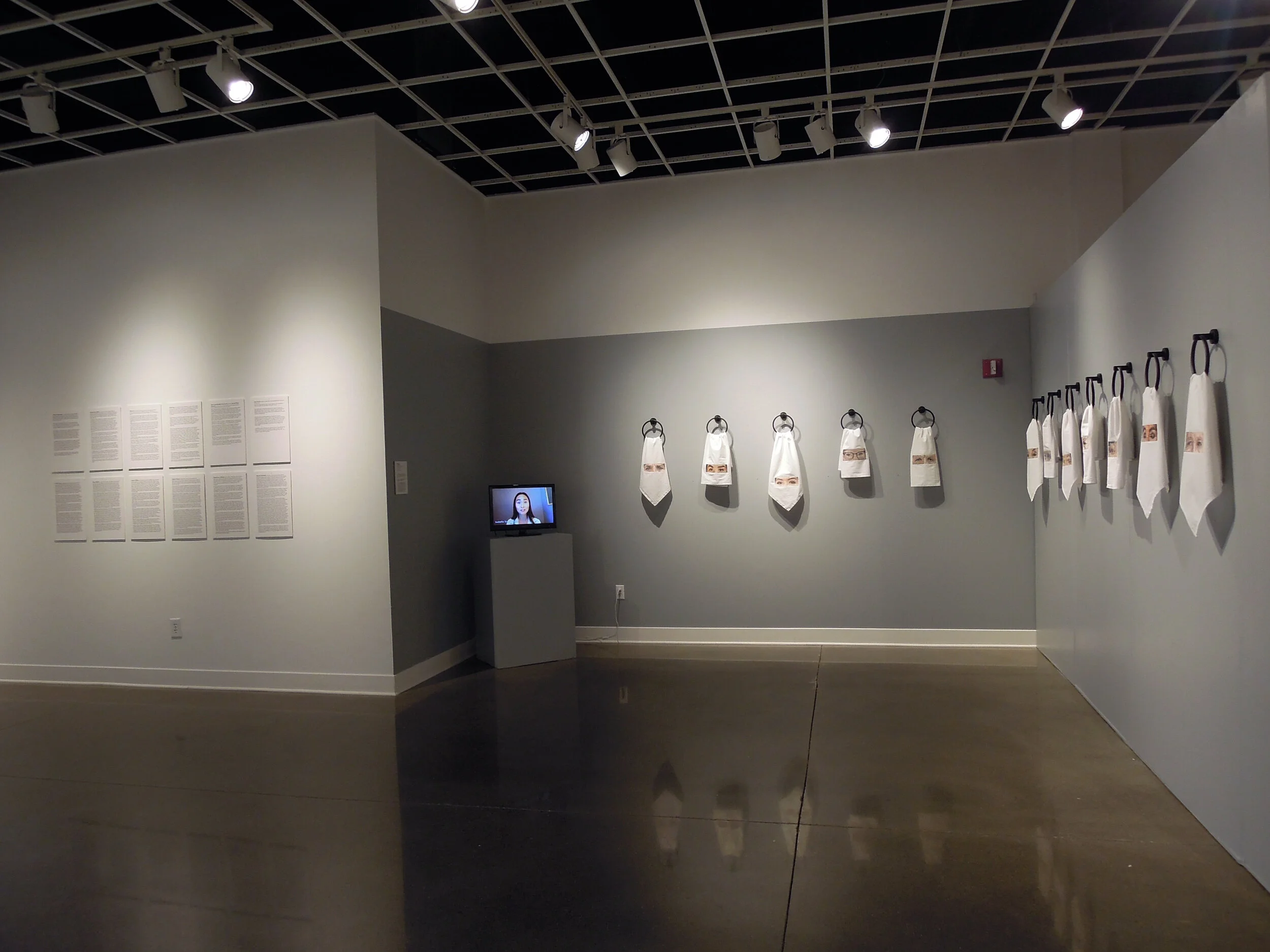
Becoming Visible, installation view

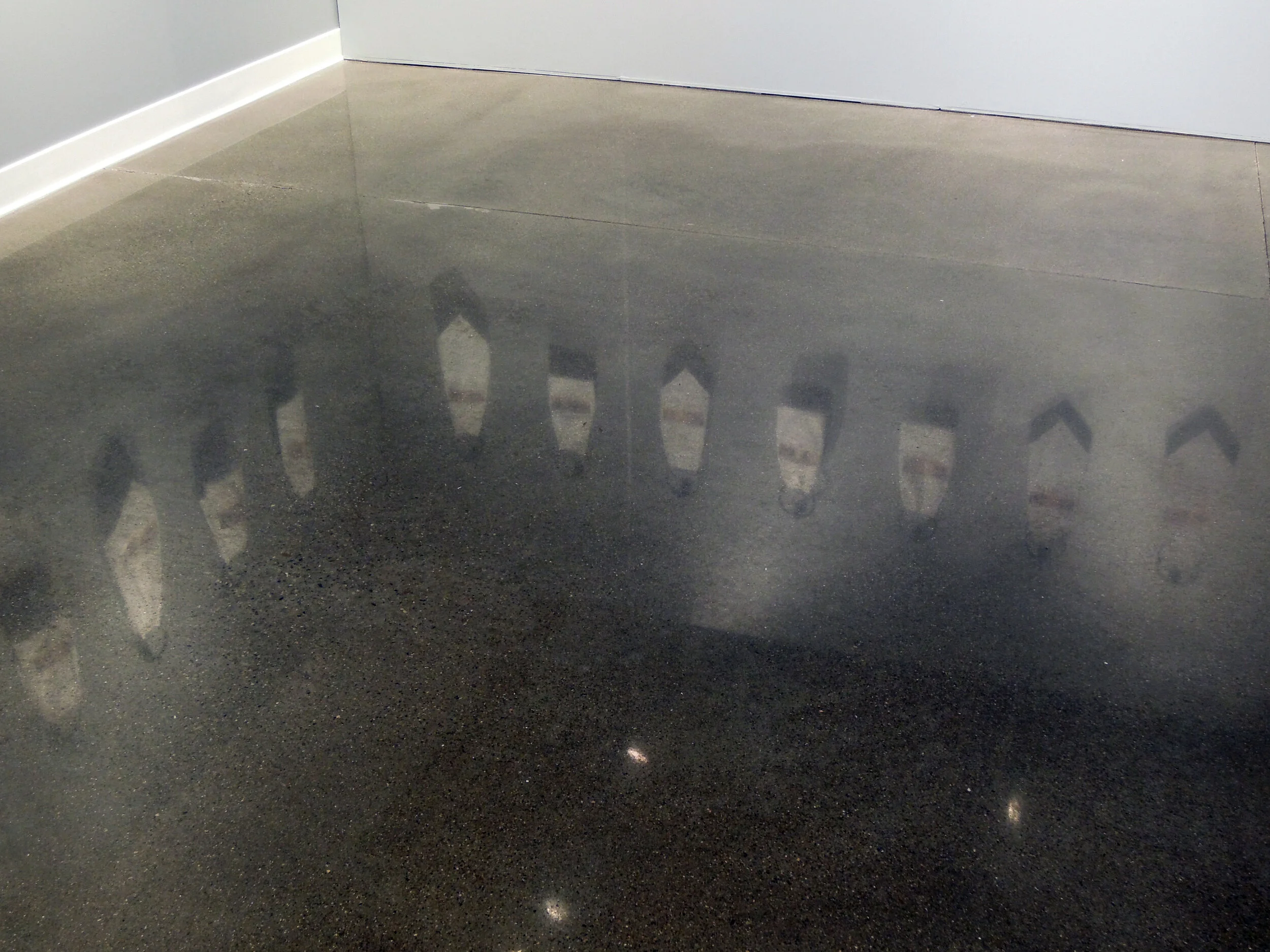

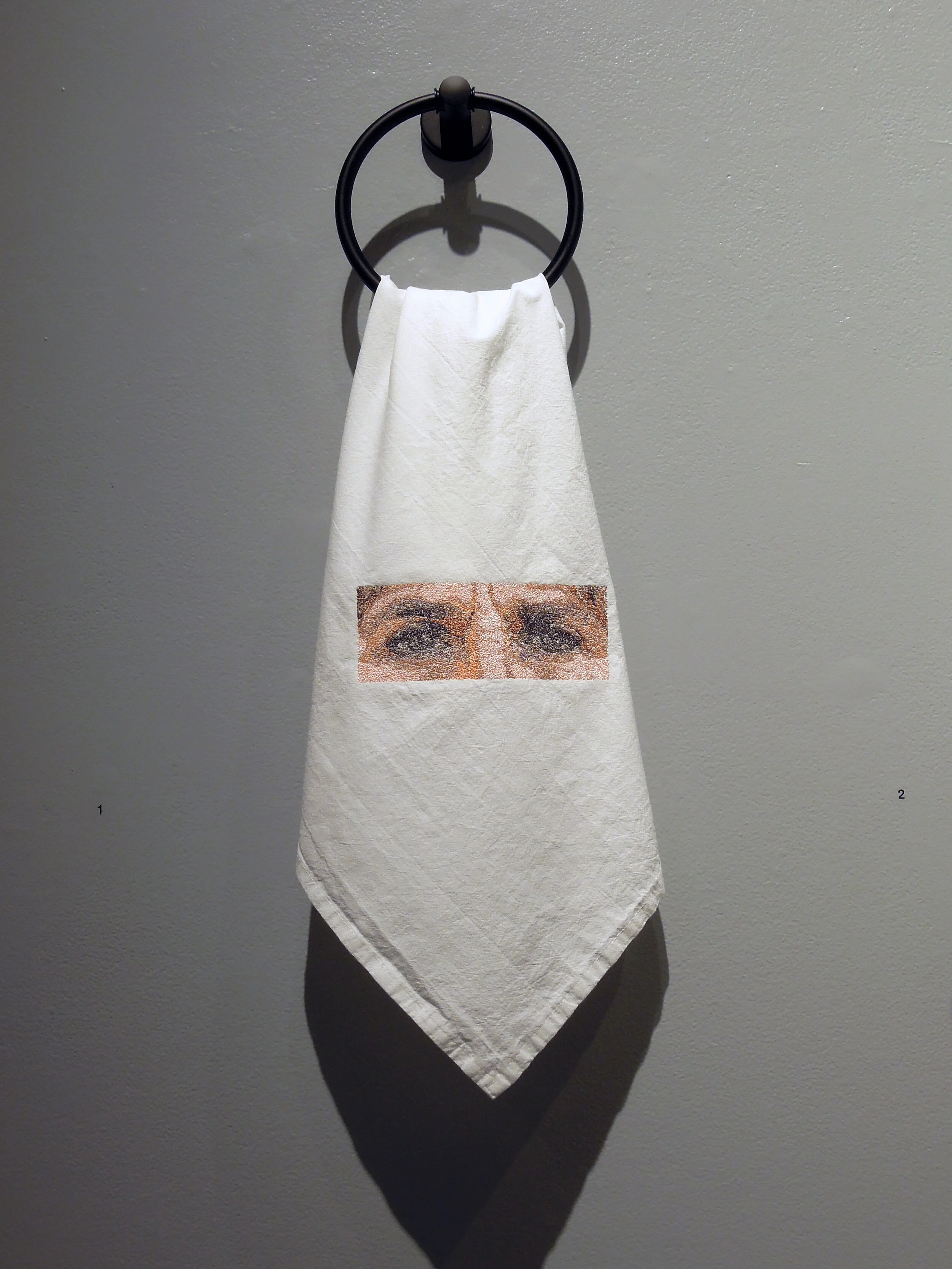
Catherine Youngman
Catherine Youngman is a 65 year old retired RN, mother, and daughter born and raised on a farm outside the little town of St. George near New Ulm, Minnesota. She is from a family of nine children, one of whom died in infancy. The oldest girl in a German Catholic family, she felt her role was to be the “good girl.” This was reinforced by an experience with an uncle around age nine or ten that she knew felt wrong.
Her childhood was dominated by life on the farm and the church. She saw her mother and her grandmother very involved with the church and community, acting as caregivers to all and sundry and took them for her role models. Growing up, she took care of many of the elders in their small town, doing their hair among other tasks. She knew she wanted to be a nurse in the 8th grade.
Starting out as a candy striper, then a nurse’s aide, she attended the LPN program at Union Hospital out of high school. After working in New Ulm for a while, she moved to St. Paul with a girlfriend and began working at St. Luke’s Hospital, eventually moving to a family practice clinic. She married and became pregnant immediately. After the birth of her daughter, she decided to be a stay at home mom because that was what her mother did. She worked on weekends and did an occasional day in the clinic, had a second daughter, volunteered at her girls’ school in the lunchroom, but devoted her time and energy to raising her girls.
Her husband was in and out of work, so when the girls were teenagers, she started taking night classes to get her RN. Needing the income, she began working full time when her younger daughter was a senior in high school. At this time she also separated from her husband eventually getting a divorce. She felt she had married him for the wrong reasons probably related to the abuse experience she had as a child. Divorce became a huge issue in her relationship with her parents, especially her mother, and she felt their disappointment acutely. As her parents aged, and first one and then the other began their final journeys, she drove to New Ulm every weekend to take care of them as a nurse and a daughter.
It is only in the last two years that she has been able to let go of the guilt and shame associated with being a divorced woman and to forgive herself. She is proud of how strong and independent her daughters are.

Isabella Star Lablanc
Isabella Star Lablanc is a twenty-three-year-old Sisseton Wahpeton Dakota actor and writer born and raised in St. Paul. She began her acting career in elementary school at Stepping Stone Theater in St. Paul and continued working in theater because it was fun. At eighteen, she decided to work professionally. She deferred enrollment at the University of Minnesota, taking a gap year to work on roles around town.
The pandemic’s effect on the theater world has placed her at the precipice of a new artistic journey. While she has been acting for more than ten years, interpreting others’ words, she has been writing poetry for five. She has concentrated more on her writing in the past two years. Storytelling is a Native tradition, but Isabella feels theater is mostly a white, western space right now. She is interested in using her own words to tell her own stories. She was recently commissioned to create an audio play at American Players’ Theater in Spring Green, Wisconsin, her first professional writing gig. The summer repertory theater was looking for a COVID-safe solution to present to audiences. She developed a piece that was recorded by company members, which audiences could access on mp3 players while they walked the trails around the theater on a self-guided tour.
Isabella comes from a large family. Her father is a poet and her mother is a social worker and an artist. She has seven older siblings and a huge extended family. Her paternal grandmother was taken from her family and placed in a boarding school in Wahpeton, ND. In 1946, the pregnant teenager ran away to St. Paul and gave birth there. Her son was taken away at birth and grew up in foster care. By the time he aged out at age eighteen, his mother had passed away. Isabella is strongly influenced by this story and honors her grandmother through her work as an actress. She feels making her presence felt on stage makes her grandmother visible.
While she may be best known for playing Tiger Lily in the Children’s Theater’s production of Peter Pan, her favorite role was the Goalkeeper in the Jungle’s production of The Wolves. She found herself amongst a cast of her peers, all the young women who would normally compete for roles with her, working together. Most recently, she was cast in the Jungle Theater’s first-ever virtual performance of “Is Edward Snowden Single?”
For Isabella, theater is a way to reach an audience. She is driven by reciprocity, something she learned as a Native kid. For her storytelling, acting, and writing are ways to offer something to her community and honor her grandmother’s life story. She is proud that she was able to start and build a career in her own way without attending college. She believes the training programs for acting were based in reliving a lot of trauma and being forced to share it, something she didn’t feel would be helpful for her. She may go back to school one day for writing. She says, “as artists, most of our work is building relationships. I would like to be remembered as a good family member, good community member, and a good person.”
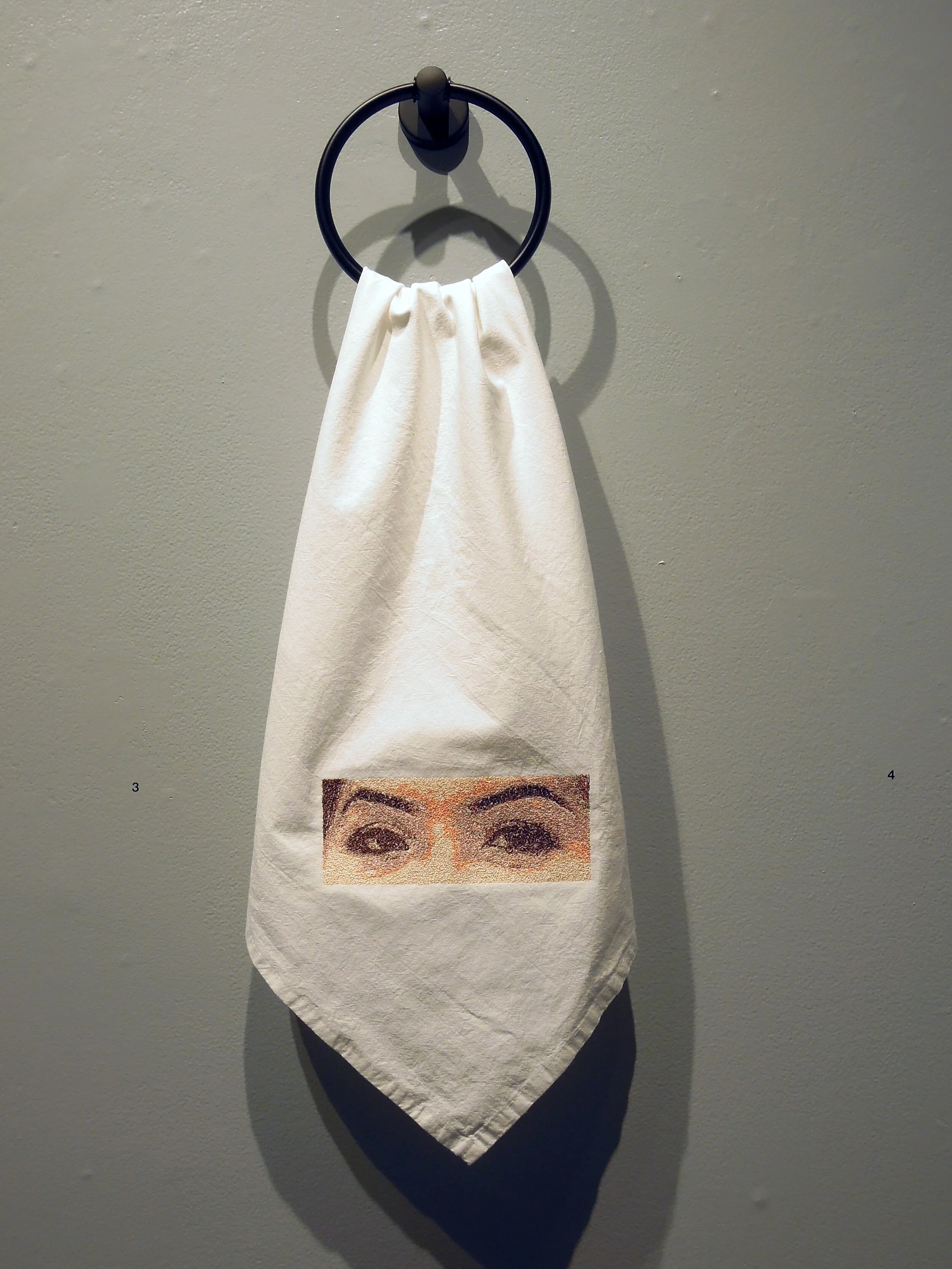
Khou Lor
Khou Lor is a thirty-year-old Hmong-American woman living in the small town of Tracy, in Lyon County, located in southwestern Minnesota. While the total population of Tracy is about 2,000, there are approximately 150-200 Hmong living there.
Khou was born in a refugee camp in Thailand. At the age of three, sponsored by her grandparents, she came with her family to Menomonie, WI. She remembers arriving in the small airport in Eau Claire in the month of December. Khou has four siblings and completed all her schooling in Wisconsin. Like many transplants to Minnesota, she came because of her Minnesotan spouse, a Hmong-American living in Tracy.
A few years ago, Khou and some others gathered to generate ideas about how best to help their community. The Hmong needed to know how to get citizenship, what the rules around hunting were, and how to expand markets for their farm produce among others. They also wanted to offer Hmong language classes to the younger generation, get parents engaged in their children’s education and have a space for elders to gather. They wanted to preserve their traditions and culture. The result was an organization called Project Uniting Southwest Hmong (PUSH). PUSH did start some of these initiatives and has since been absorbed by the Southwest Hmong Association (SHA), a larger group accepted by the elders of the community. In mid-2020, Khou was elected the first female president of SHA. She says the elders of the community have decided it is time to pass the mantle to the younger generation.
In addition to being president of SHA, Khou works as a leasing specialist for US Bank, is a photographer, advocate and mother to four-year-old Willow. Having been a refugee, she wants to help others learn how to navigate American society, teach them how to help themselves and then pass that knowledge on to others. She says, “There’s an importance to valuing yourself. It takes knowing who you are to find where you belong in this world.”
Khou says her biggest challenge is finding a balance. Being a mother, a photographer, community volunteer, leasing specialist, wife, and doing home remodeling takes a lot of time. Her personal dream is to eventually own a business in the wedding industry. Her dream for her community is more complicated. Like many immigrants, she wants the Hmong to be successful and able to navigate American society, to become accepted as an integral part of Tracy, and still hang on to their unique heritage and language. Furthermore, she would like to see the non-Hmong population of Tracy learn something about Hmong culture and celebrate their neighbors.
When asked what she wants people to say about her after she dies, she said this. “I value relationships and friendships a lot. When you are alive, you should give people your all. Do everything with all your heart. You should stay true to yourself so that you have no regrets about what you did or didn’t do. I would want people to know that I did everything with intention and truth to who I am as a person.”
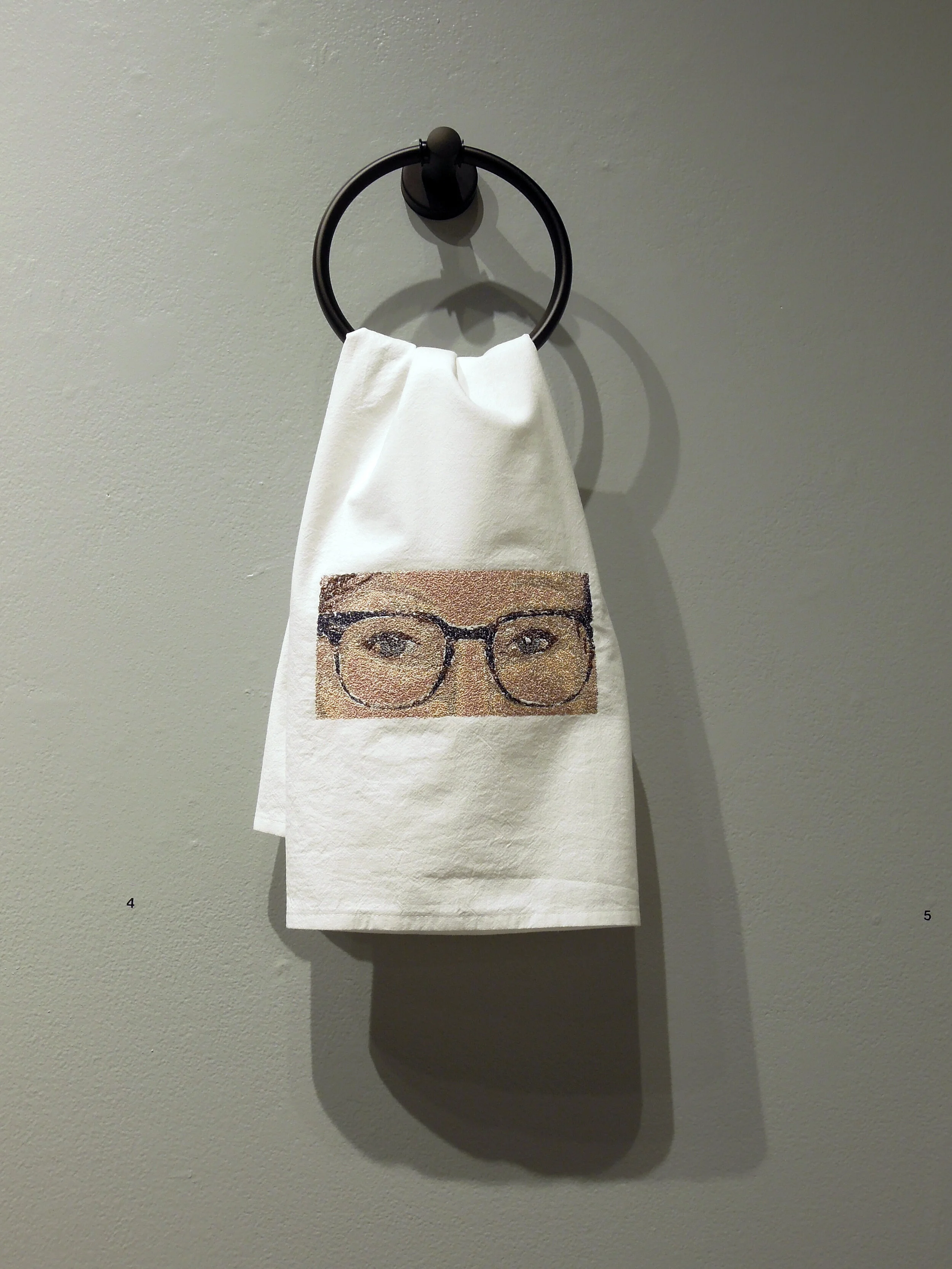
Ellie Krug
Ellie Krug is a transplant to the state of Minnesota, or as she calls it, a refugee. In 2009, she was a practicing trial lawyer in a successful law firm in Cedar Rapids, IA. Married to the love of her life, with two daughters and financially well off, she made a decision that would cost her everything. At age 52 she transitioned gender. By early 2010, she had closed her law practice and made the decision to move to Minneapolis partly because it was known as welcoming to the LGBTQ community.
Born in Newark, NJ in 1956 with an assigned male gender, Ellie moved with her family to Cedar Rapids, IA at age 11, moving from a lower middle-class neighborhood to an upper middle class neighborhood overnight. It was a life-changing experience for Ellie as it was now expected she would attend college. She was inspired at a young age by the civil rights movement and decided to become a lawyer to change the world. However, an aversion to debt and attempting to suppress her gender dysphoria worked to divert her from her idealistic beginnings.
After moving to Minneapolis, she has remade herself into a unified, kind and gentle human being. In December 2011, she founded a legal access nonprofit named Call for Justice that was a resource to nonprofit agencies serving a clientele making lower incomes with attorneys and available legal resources. In three years, due to her efforts, Call for Justice LLC was given an American Bar Association award for innovation. She wrote Getting to Ellen: A Memoir about Love, Honesty and Gender Change, published in February, 2013 (Stepladder Press). She currently has a radio show and podcast, Ellie 2.0 Radio, on KTNF, AM 950, which focuses on stories about idealists/people trying to change the world. She also writes columns for Lavender magazine and Minnesota Women’s Press. In late 2016, Ellie launched Human Inspiration Works, a diversity and inclusion training company. She travels around the country, speaking about human inclusivity. She also curates a newsletter every month that goes out to over 9,000 people, sharing stories about humans doing good towards other humans.
At the end of every training she conducts, she makes a standing transferable offer to meet with any human in a public place for an hour about anything about surviving the human condition. She states, “If I can give somebody an ear for a whole hour, maybe that’s one of the ways that I can try and make the world a better place.”
She acknowledges the difficulties of being an older transgender woman when it comes to love. It is difficult to find partners and as a man, she had a relationship with the love of her life. She would like to be loved as Ellie. She states, “Every transgender person I know has lost people.” One of the best decisions she made was to leave the door open to her older daughter who came back into her life after a four-year estrangement.
She says when she is gone someday, she would like people to say about her, “She was kind. She was a good person. She made a difference in the world.”

GGM Mary Lyons
Great-grandmother Mary Lyons (given name Second Water Woman) is an Ojibwe Elder, formally known as a world-renowned Wisdom Keeper, an Empowerment Coach, Activist and Author. She has dedicated her life to helping people take command of their lives in highly effective, powerful, positive ways and has spent nearly fifty years teaching thousands of people meditation, prayer, affirmation, and intuition. She is mother to nine children, grandmother to twelve and a great-grandmother to one—not to mention all the children that she has fostered throughout the past fifty years.
She is the author of “Wisdom Lessons,” focusing on self-development, self-care and personal empowerment. She is an International Keynote speaker and seminar leader, and has been active in the Parliament of World Religions, NYC Climate March, Global Elder’s Gathering on Climate Change and serves as a United Nations Indigenous Observer.
GGM Mary is a visionary co-founder of several global groups, including Women of Wellbriety, International (a 100% volunteer online wellness group with yearly gatherings that promotes sobriety and healing) and Grandmothers of the Sacred WE.
She grew up during the boarding school era, when indigenous children were forcibly removed from their homes and brought to boarding schools to be “educated.” She was sexually victimized as a child by a religious order. Over thirty years ago, her youngest sister was murdered. She adopted her three nephews, and it took her many years before she was able to come to terms with the manner of her sister’s death and the resulting non-action. She continues to work at the intersections of criminal justice, environmental issues, child welfare systems and develops policy and advocacy strategies to help the cause of MMIW (Missing and Murdered Indigenous Women) and reduce the chances of indigenous family separations.
She says, “The worst holocaust in this world was with indigenous people here on these lands. We’re hidden in plain sight. People can’t understand and accept the pain that’s happened in their own countries.”
She wants to be remembered as a good student, a good person, a good friend, a good gardener and one who walked the path she talked about. As an Ojibwe Elder and a non-violent direct action activist, she believes we can change the world for the better again if we come together as a community.

Kate Tucker
Kate Tucker was born in central Illinois near Springfield in farm country, but has spent more than half her life in Minnesota. She is a retired Unitarian Universalist minister, writer, poet, mystic, life-long student, and spiritual director.
After completing her undergraduate education with degrees in English and Psychology, she moved to the Twin Cities to attend the University of Minnesota, graduating with an MFA in theater acting. Looking for a way to synthesize writing, counseling and psychology, justice work and administrative work, she hit on ministry serendipitously.
Among her many jobs, she has worked as an administrative assistant, undergraduate counselor, children’s librarian, and in a soup kitchen. She moved to Portland, Oregon to be an interim associate minister and eventually returned to Minneapolis to serve as a much beloved associate minister at First Universalist Church. In her capacity as minister, she did a lot of one-on-one pastoral care visits, conducted weddings and funerals and gave many sermons that wove poetry, storytelling and philosophy around a central theme utilizing all her different skills.
In retirement, she has continued to be a spiritual director, a companion who sits and journeys with a person, knows and listens to their story. She has been meeting with two women poets regularly and an anthology of their work, “The Less Said,” is now available on Amazon.
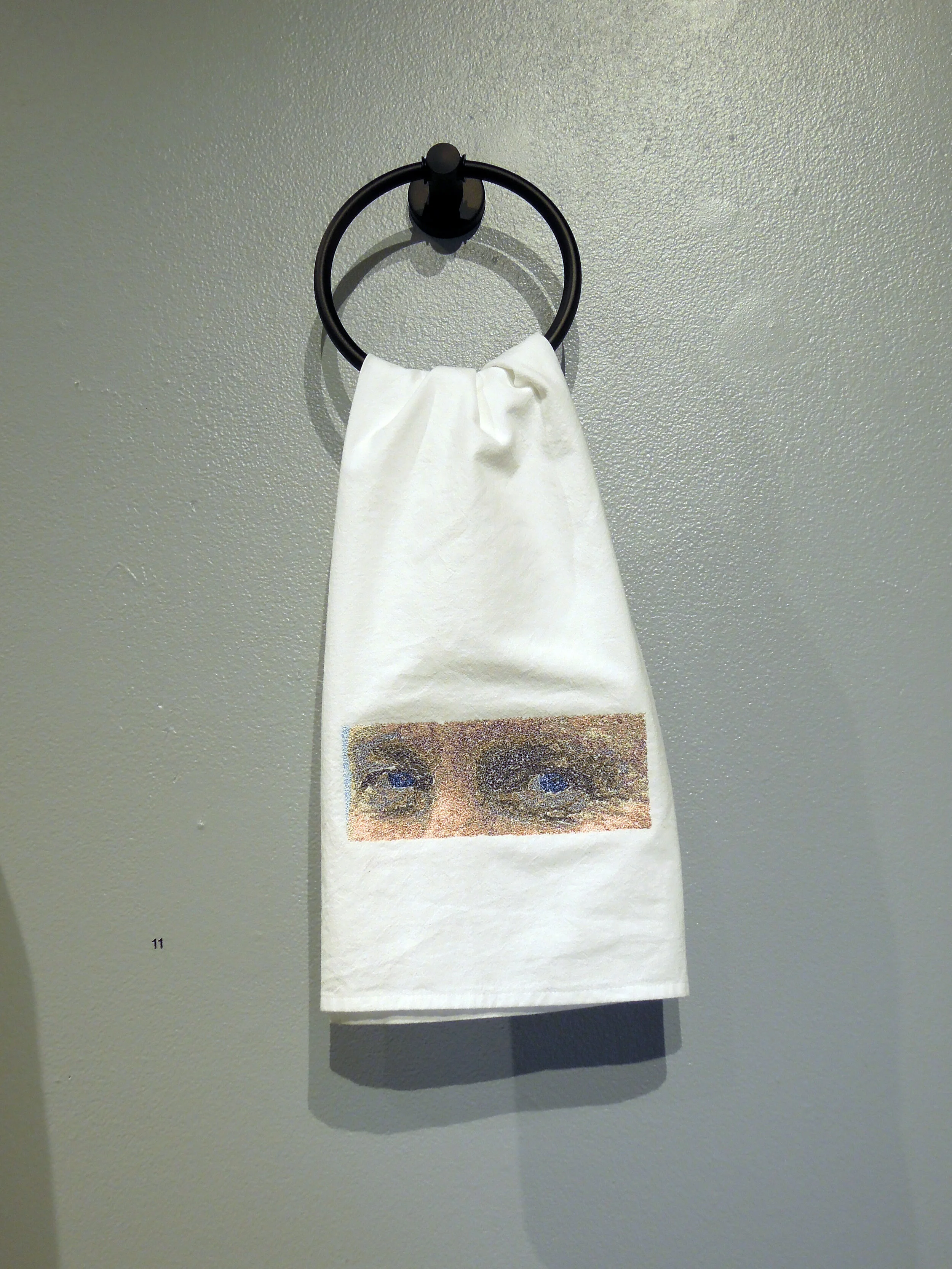
Caitlin Gregg
Caitlin Gregg is a professional cross country skier and represented the US at the 2010 Winter Olympics in Vancouver, BC. Born in New York City, she lived in Manhattan till the age of 10, when her parents divorced and her mother relocated with her and her brother to Vermont. At age 10, Caitlin already knew she wanted to be an Olympic skier. She made Nationals in high school and after advice from the US Ski team, decided to attend Northern Michigan University in Marquette, MI. She had to come on the college team as a walk-on, as they had already picked athletes for scholarships when she applied. Instead, she became the first all-American runner for the university which gave her a full-ride scholarship and a spot on the Varsity ski team. She earned a BFA in Environmental Design, a degree for pre-architecture students.
After graduation, she relocated to St. Paul to support her mother during cancer treatment. Her mother encouraged her to stay here to work on her Olympic dreams as Minnesota has a vibrant cross-country ski community. Caitlin was not guaranteed a spot on the team, but had to qualify based on races before the Olympics. She worked and trained mostly at Theodore Wirth Park and wrote her own training plan. Not only did she go to the Olympics in 2010, but she has also won several American Birkebeiner races (held in Hayward, Wisconsin), and competed in World Cup events in Europe, where she medaled in 2019.
Caitlin and her husband, Brian, were able to buy a small house in North Minneapolis with winnings from different races and have lived for almost ten years just two blocks from Theodore Wirth Park. They love their community and their neighborhood. They have worked with an organization called In The Arena which brings together elite athletes with at-risk youth. Through it, they volunteered at the Jerry Gamble Boys and Girls club for 5 years where they started a Run Club for elementary age kids at Glendale Park three days a week. One summer, the entire club ran over 2000 miles together.
Known in their neighborhood as people who are always doing something outside, they engaged the neighborhood kids who were curious about them in conversation. She wanted to share her love of the outdoors and exercise, so she and her husband worked on getting outdoor equipment (bikes, helmets, skis etc.) for the youth, showed them safe routes to Theodore Wirth park from the neighborhood and the different trails they had access to and eventually introduced them to the Loppet Trail Kids program. Caitlin had a lot of community support to help her achieve her Olympic dream and she wants to extend this support to others, encouraging them to pursue their dreams and passions. She believes, despite barriers, that the key to success is reaching out and making connections and getting community support.
Caitlin is mother to a two-year old who she and Brian take everywhere when they are out training and exercising. As a female athlete, she sees some challenges. Both she and her husband are former Olympians. There has been an assumption that he wrote their training programs, decided on which ski wax to use for different weather conditions etc., but in fact Caitlin has been her own coach and even helped Brian train for his Olympics in 2014, piecing together his schedule and working the mental training necessary for any world class athlete. She will now coach a High Performance Team through the Loppet Foundation made up of mostly Loppet Nordic Racing Juniors, helping them to reach the next level of making the Olympic team. And she will continue to race.

Natya Stroud
Natya Stroud is a 43-year-old Black woman born and raised in North Minneapolis by a single mother. Her stepfather came into their lives when she was 5. She showed early promise in kindergarten and was admitted to the gifted and talented program. Natya continued accelerating in her studies and scored ahead of her grade-level peers in high school. Though baptized in the Baptist church, as a sophomore, she and her boyfriend began exploring other religious homes. They settled on Islam as the best option. They married while still in high school and Natya became pregnant with twins. Despite being put on bedrest in the later stages of pregnancy, she continued with her school work and did not fall behind. She later transferred to an alternative school for teen mothers where she was able to take parenting classes as well as Advanced Placement courses.
She and her husband lived in public housing in North Minneapolis. While she was raising the children and her husband was working, she worked as a teaching assistant and began taking college courses initially to become a teacher. She eventually switched to nursing, getting her Associate’s degree. She had four more children in the 7 years following the twins. When the twins were 5, the family moved to South Minneapolis, once again living in public housing for about four years. Once she had her Associate’s degree, she got a job, and along with her husband’s income, they qualified to buy a house. They moved to Fridley where their children had been enrolled in a private religious school run by Muslims. Needing financial security, she quickly moved on to get her Bachelor’s degree in nursing. While working in a medical/surgical unit in a hospital, she decided to enroll in the Doctorate of Nursing Practice program at the University of Minnesota. Her husband had started his own delivery business and was working 7 days a week during this time. Though it was not advisable to work while attending the program, Natya did not have a choice. She did not want her children to experience the poverty she and her husband did in their youth.
Natya was also involved in many volunteer activities. She remembers that with one of her pregnancies, there was a place operated by a church, that supplied gently used clothing, baby supplies and furniture, packs of diapers etc. She started a similar project in South Minneapolis where people could donate items, and she would sort through them, clean them and make them available for others to pick up and use. She says there are a lot of people of color who have converted to Islam. Wanting a group like the Girl Scouts without the Christian overtones, she began holding a weekly class in her home where the girls would do crafts, fundraise for various organizations, and learn about the prophets and religion. She was a founding member and served on the board of Sisters Need A Place, a domestic violence shelter for women and children started by the Muslim community. She also served on the State Board of Nursing working to update the laws surrounding the practice of nursing. She currently works 4 days a week in two clinics in addition to teaching part-time at the University of Minnesota and serving on a Diversity, Equity and Inclusion Committee at work.
Although she and her husband have been married many years, she has not seen many examples of stable relationships in her family. She says, “Although I have a big family, no one’s going to take care of me but myself at the end of the day.” This drives her to work hard, to be financially independent and to create a structure and base of support so she can be flexible and adaptable if life throws her a curveball. Her faith has helped her understand that she is not in control of anything. She can only do her best, but ultimately things happen. Accepting this lack of control leads her to feeling content with her life.
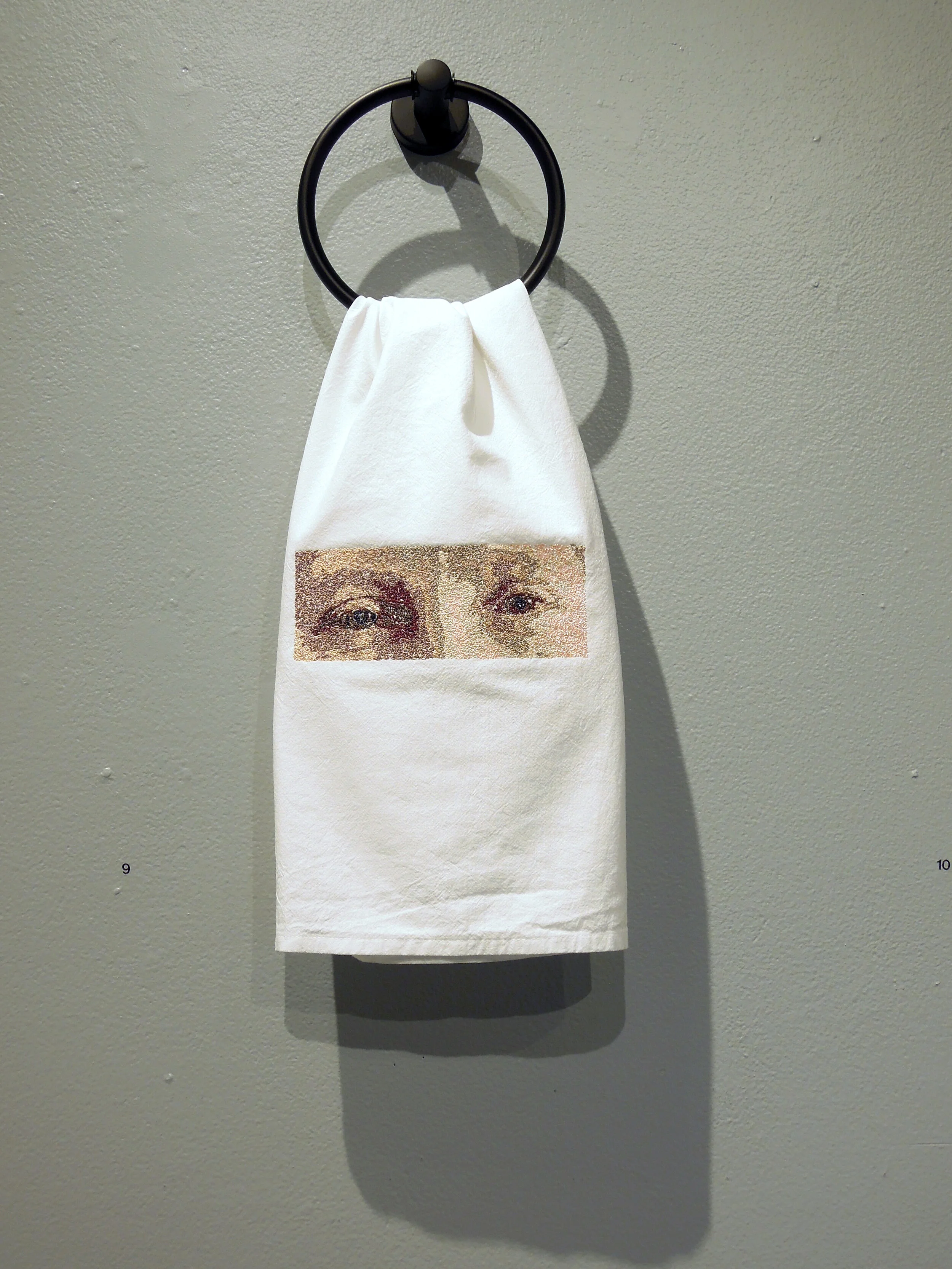
Suzann Willhite
Suzann Willhite, the youngest of 14 surviving children from a large farm family in southwestern Minnesota, grew up near the town of Walnut Grove. She saw many of her older siblings get married or have children right out of high school and have difficulty making ends meet. She decided she wanted something more. She is the first person in her family to go to college and get a Bachelor’s and a Master’s degree. She had a thirty-plus year career working for the US Forest Service, National Park Service and the Minnesota Department of Natural Resources (DNR). During her career she tried lots of different jobs, eventually ending up in management. At the DNR, she tried to hire affirmatively, realizing that the biggest beneficiaries of affirmative action had been white women, not people of color.
Initially very shy, she realized in college that she had to advocate for herself and started to be more assertive. She also began advocating for others. She stepped into leadership and advocacy roles in her family, neighborhood, church and community, taking care of her mother’s finances, serving as a block captain, and leading groups at church. She also worked to pass ranked choice voting in Saint Louis Park and was very involved with the marriage amendment, ensuring the right to marry for LGBT individuals.
While in college, Suzann realized she was attracted to other women. Coming home, she came out to her mother whose only concern was that Suzann be happy. 2020 was a big year for her. She separated from a 22-year committed relationship and retired. She had planned to travel and advocate for racial and social justice issues she cared about, but then the COVID-19 pandemic began and her plans were interrupted.
Growing up, Suzann saw inequality in her family, in the roles men and women played. Her father had an explosive temper and she saw him physically abuse her mother. She decided she wanted a different life where she was valued as an individual regardless of gender.
Since 2016, the passage of the Equal Rights Amendment has become a big issue for her. The ERA outlaws discrimination on the basis of sex and was introduced in 1972. Virginia was the 38th state to recently ratify the amendment, which is the minimum number of states needed to add this to the U.S. Constitution. However, there is still work to be done to make this 28th amendment a reality. Suzann would also like to see this added to the Minnesota State Constitution as 26 other states have done.
Many of her family members are on the opposite side of the political spectrum from herself. Navigating these different political views within her family is a challenge, but she is committed to keeping in conversation with them. It is important to her that ordinary people on both sides become more educated about the issues and more engaged in the democratic process.
Suzann describes herself as an ordinary Minnesotan, average, hard working, optimistic, practical, inquisitive, thrifty, adventuresome, a seeker, an avid reader, and a doer. She spends 10 to 15 hours a week volunteering her time for various causes. She also gives money to organizations she believes in because she wants to make a difference. Despite growing up poor, she realized as a white woman, she had access to spaces not open to people of color. She believes in equity of opportunity for all and attributes that to the example her mother set for her.
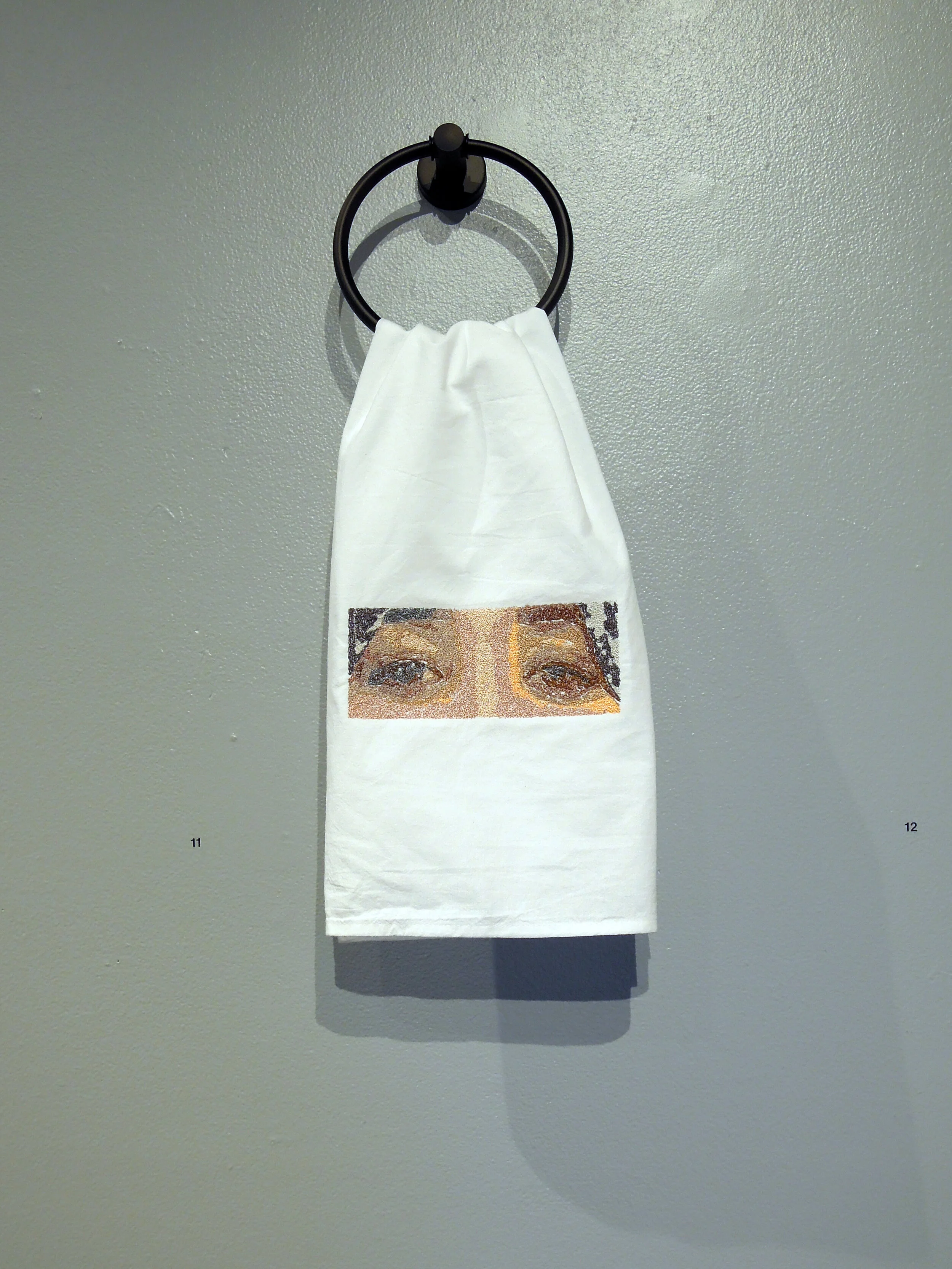
Fadumo Hassan
Fadumo Hassan is a single mother of three and equity specialist in the Bloomington school district. She comes from a family of educators. Born in Somalia, she and her family moved to Kenya in 1991 when she was 10. Already speaking Somali, Arabic and English, she added Swahili to her repertoire of languages in Kenya. After graduating high school, she worked for a time as an interpreter for the UN with a refugee camp on the Kenya/Somalia border.
She married and had her first child and emigrated first to San Diego and then Minnesota. While she spoke English, she didn’t understand the way the educational system was structured in the US. In Kenya, if you did well, you could skip grades, and if you did poorly, you were held back. Teachers were like second parents and their word was not questioned. Parents were not involved in the minutiae of their children’s education but trusted the teachers to educate their children. They didn’t have to arrange for extracurricular activities in order for their kids to be well rounded. Race was not an issue and students were treated equally.
When her son was in first grade in a large suburban school district, she was called into a meeting and told her son was a candidate for Special Education services because he was struggling to sit still, couldn’t stand in line in the hallway, and seemed generally inattentive. She didn’t know what Special Ed. was and had to ask someone in the Somali community to explain it to her. She did not attend conferences because she didn’t know their importance. Once she learned more about Special Ed., she went in and told the teachers how well her son did work at home and that he was bored in the classroom. She insisted he be tested and as a result, her son skipped second grade. She began talking with other parents of all nationalities and realized how many boys had been overlooked by the system, and how many parents could not advocate for their children the way she had.
When her older son got his driver’s license, he was pulled over and given a ticket frequently. As a single parent, it was difficult to pay these tickets, but if she didn’t, there would have been a warrant placed for him. She says she has been pulled over a few times but has never received a ticket herself and wonders how the system works for young, black men.
As an equity specialist, Fadumo works with families, mentors students, leads cultural trainings, translates, facilitates meetings about student progress and advocates for the students and parents from communities of color in order to open up higher educational opportunities for them. She has developed a sense of responsibility to educate students and parents alike on how the educational system works. She organizes an annual neighborhood book exchange and holds Facebook events where folks can discuss sensitive situations of discrimination. She is the precinct chair for the DFL for her district, caucuses for elections, and volunteers for candidates with a similar vision to hers. She is a member of the interfaith group ISAIAH. After 17 years in a suburban school district with plenty of resources, she ran into the same problems with her second son as she had with her first. This made her wonder if anything had changed and inspired her to run for the school board. Twice. While she says she doesn’t have all the answers, she is very concerned that children of color are struggling with drug addiction, overdoses and incarceration. She cites instances of discrimination that many children of color and their parents experience as part of the problem. She feels many of these issues need to be addressed early in the educational experience.
Understanding cultural differences is also important. She made many home visits herself this past year during the pandemic to reach out to children and parents who were getting lost in the switch to online learning.
She was taught that when you see something wrong, say something. If you are silent, you are part of the problem. She wants her children and her children’s children to be good citizens who contribute to society and she wants to dismantle the systemic racism that works against them. When asked how she would like to be remembered, she says, “I am always honest. I always stand up for what’s right and I want what’s best for everyone. I can be biased and make mistakes but I always have good intentions.”
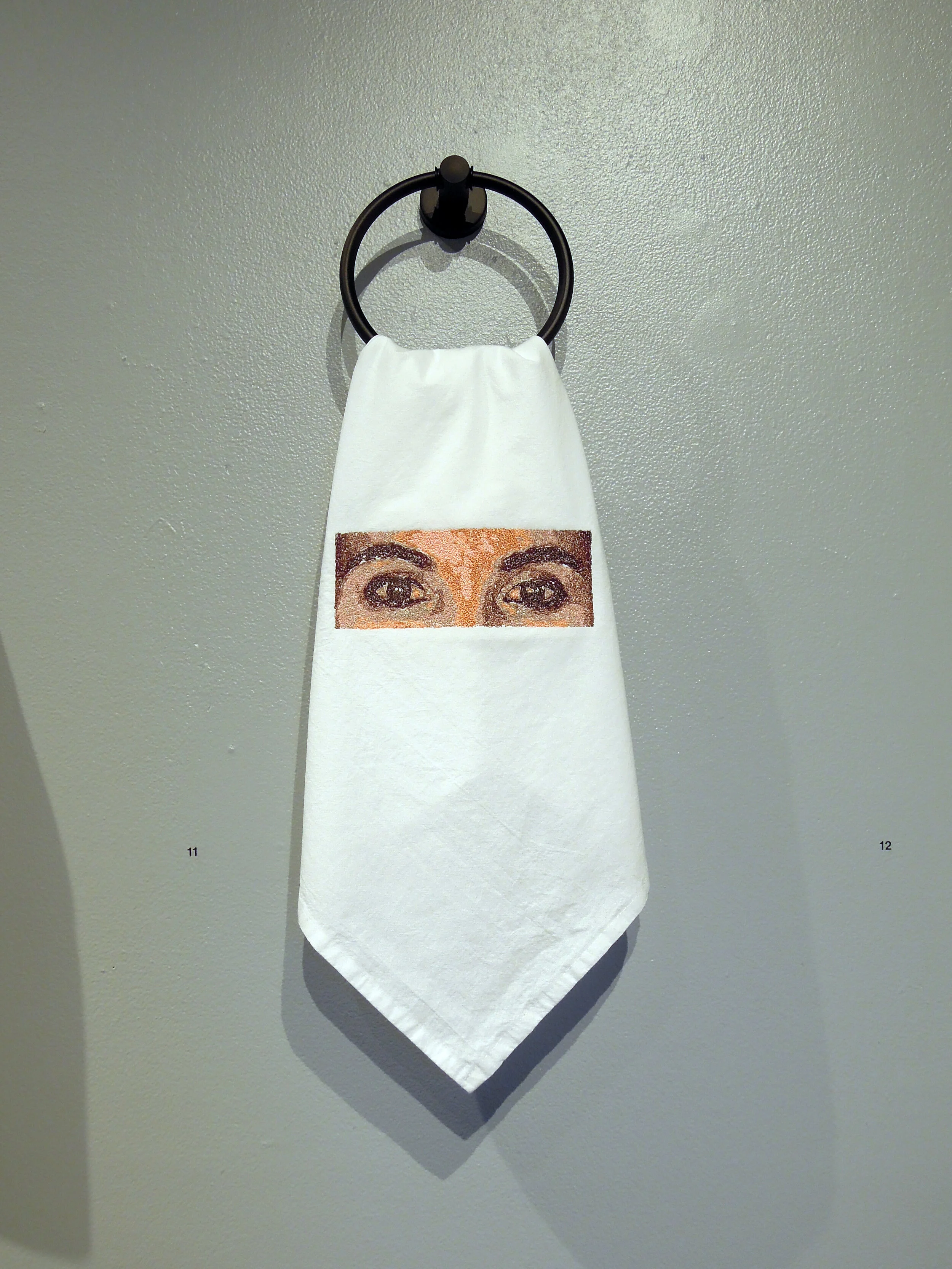
María Ponce-Khoury
María Ponce-Khoury was born in Mexico and immigrated to the United States with her family in 1992 at age ten. Her family settled in Aurora, Illinois where she attended a private Catholic school. Her father was a dairy farmer with a 6th grade education. He worked through the Bracero program as a seasonal farm worker in the U.S., to send money to her mother and their five children. He saved enough money to afford the fees for the Catholic school once they immigrated.
In Mexico, María was at the top of her class, but coming to the US changed all that. The transition was traumatic for María and her sister as they spoke no English when they arrived in Aurora. The Catholic school did not have an ESL program and was not equipped to teach students who didn’t speak English. She was inspired by her bilingual middle school teacher who was from the same area in Mexico and who helped her and her sister to adjust.
Western Illinois University was known for its bilingual education program and María got certified to teach K-6 elementary education, K-12 Spanish as a second language, and English as a second language for middle school. She moved with her husband to Minnesota in 2007 and was hired to teach second grade in a Spanish immersion school. Her school has done racial equity and antiracist work in the last five years, hoping to improve the achievement gap between white students and students of color.
María took this last year off to focus on her son’s needs during his last year of preschool. He was recently diagnosed with autism. While home, she has continued to volunteer at the school, helping out her fellow teachers, working with students who need extra help reading, organizing outdoor playdates and get togethers for students, and reaching out to families of color helping them navigate the school system. She loves to bake, and began making healthy treats for their one year old puppy. It is something with which both her son and her 8-year-old daughter can help. She made samples to share with friends and family and recently received her first order.
Her husband is Lebanese-American and she feels he has made her more curious to learn about other cultures. It is tricky to get their families together as his parents are in Lebanon and hers are in Mexico and neither speak much English. She does see similarities between the cultures in which they were raised, particularly in the role of wife and mother. Although she and her husband are a modern couple, she feels an expectation from both sides of the family to conform to a gendered division of labor including cooking, cleaning, housework and taking care of all the children’s needs, schoolwork, etc.
She holds up her father as one of her role models. She describes him as full of kindness and empathy and with a strong work ethic. He loves animals and taught her how to love nature and how to work hard for what you want in life. Both he and her mother had to quit school in order to work to support their families. They came to the US so their children would have a better chance at life. Her father worked doing drywall, saved for retirement and bought land to add to what they already owned in Mexico. His heart was always in his hometown and he and her mother moved back after retirement.
Her greatest joy is seeing her students smile and have fun, and seeing the spark in their eyes when they learn something new.

Sharron Steinfeldt
Sharron Steinfeldt, née Gordon, turns 90 this year and has lived in Hopkins for the past 60 years. Born and raised in St. Paul, MN to Jewish parents, she recalls the Neighborhood House as a wonderful community center where families could come to learn English, and where she learned cross stitch embroidery and developed friendships with other neighborhood children. Her father emigrated from Russia as a boy and had only a 3rd grade education. Sharron recalls moving a lot as a child, but always within the confines of St. Paul. She says this was never disruptive as she had a supportive family, and she had the added advantage of living in many multicultural neighborhoods. She remembers she and her sister volunteering at a little school when they were 10-12 years old taking care of younger children.
Sharron has been interested in people all her life. She has a network of friends and acquaintances who she is happy to connect when projects come her way. While she graduated with a degree in early childhood education, she felt pulled to work in business, starting with summer clerical jobs as a teenager. She met Orrin Steinfeldt in her twenties and they were married almost 60 years before his death 6 years ago. They moved to Hopkins to start a family and had 3 children in rapid succession. She spent her time volunteering until the children were in high school, when she went back to work in real estate.
Sharron became very involved with the National Council of Jewish Women (NCJW), particularly with the Community Services division. She served on the board of the Northstar Daycare Center in north Minneapolis in the 1950s. This was when daycare centers were just opening. Northstar had a diverse population, and the parents’ group did not hesitate to let the board know what was important to them. She also was a member of Women in Community Service, another subgroup of the NCJW. She became involved in Job Corps through another board that included representation from Council of Catholic Women, Church Women United and the National Council of Negro Women. Their job was to help girls who had signed up for the Job Corps to get hired. Sharron felt she learned a lot from the other women on the board. She feels serving on the Council helped her to be in the community, to be of service, the foundation of which was laid in her childhood experiences.
She was also instrumental in establishing the Jewish Historical Society of the Upper Midwest. It started when her friend, Marilyn Chiat, who had done a doctoral dissertation on Jewish people who had settled in small towns in Minnesota and had a degree in Women’s Studies, wanted to do something with all the data she had collected. Sharron was able to connect her with more people in the community who could help. With help from a rabbi, Hamline University, the NCJW and numerous volunteers, they were able to collect more stories and artifacts from Jewish residents of small towns in Minnesota and the Dakotas and eventually establish the society. She is particularly proud of a collaboration with the Minnesota Historical Society resulting in the exhibition, Unpacking On The Prairie.
At 90, Sharron says for her, life’s purpose is, “to reach out to others and to do the best I can with what I have.” If you have a lot, it’s important to share it. If you don’t have material wealth to share, you can listen and give your time and attention. She believes when you see something wrong, you should speak up. She says she is better at speaking out to bring people together, but wants to be better at calling people out.
